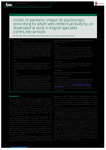COVID-19 pandemic impact on psychotropic prescribing for adults with intellectual disability: an observational study in English specialist community services
| dc.contributor.author | Naqvi, D | |
| dc.contributor.author | Perera, Bhathika | |
| dc.contributor.author | Mitchell, S | |
| dc.contributor.author | Sheehan, R | |
| dc.contributor.author | Shankar, Rohit | |
| dc.date.accessioned | 2021-12-06T11:17:54Z | |
| dc.date.available | 2021-12-06T11:17:54Z | |
| dc.date.issued | 2022-01 | |
| dc.identifier.issn | 2056-4724 | |
| dc.identifier.issn | 2056-4724 | |
| dc.identifier.other | e7 | |
| dc.identifier.uri | http://hdl.handle.net/10026.1/18442 | |
| dc.description.abstract |
<jats:sec id="S2056472421010644_sec_a1"><jats:title>Background</jats:title><jats:p>Coronavirus disease 2019 (COVID-19) has had a disproportionate impact on people with intellectual disability (PwID). PwID are at higher risk of mental illness and receive psychotropic prescribing ‘off licence' also, to manage distress behaviour. The lockdown and reduction of multidisciplinary face-to-face appointments had an impact on care delivery, the recourse possibly being psychotropic prescribing. It is imperative to comprehend the influence the pandemic had on psychotropic prescribing patterns to enable future planning.</jats:p></jats:sec><jats:sec id="S2056472421010644_sec_a2"><jats:title>Aims</jats:title><jats:p>The aim was to understand the impact of the pandemic by comparing psychotropic prescribing patterns during the England lockdown with the prescribing patterns before lockdown in specialist urban and rural psychiatric services for PwID.</jats:p></jats:sec><jats:sec id="S2056472421010644_sec_a3" sec-type="methods"><jats:title>Method</jats:title><jats:p>Data was collected from Cornwall (rural) and London (urban) intellectual disability services in England as a service evaluation project to rationalise psychotropic prescribing. PwID in both services open across January 2020 to January 2021 were included. Baseline patient demographics including age, gender, ethnicity, intellectual disability level and neurodevelopmental and psychological comorbidities were collected. Baseline psychotropic prescribing and subsequent % change for each psychotropic group for the two services was compared using Pearson's chi-square and <jats:italic>z-</jats:italic>statistic (two tailed) with significance taken at <jats:italic>P</jats:italic> < 0.05.</jats:p></jats:sec><jats:sec id="S2056472421010644_sec_a4" sec-type="results"><jats:title>Results</jats:title><jats:p>The two centres London (<jats:italic>n</jats:italic> = 113) and Cornwall (<jats:italic>n</jats:italic> = 97) were largely comparable but for baseline differences in terms of presence of severe mental illness (37 <jats:italic>v</jats:italic>. 86, <jats:italic>P</jats:italic> < 0.001), challenging behaviour (44 <jats:italic>v</jats:italic>. 57, <jats:italic>P</jats:italic> < 0.05) and attention-deficit hyperactivity disorder (37 <jats:italic>v</jats:italic>. 3, <jats:italic>P</jats:italic> < 0.001). There was an overall increase in psychotropic prescribing during lockdown in urban as compared with rural settings (11% <jats:italic>v</jats:italic>. 2%).</jats:p></jats:sec><jats:sec id="S2056472421010644_sec_a5" sec-type="conclusions"><jats:title>Conclusions</jats:title><jats:p>The pandemic caused an increase in psychotropic prescribing associated with lockdown severity and urban settings. Team structures could have played a role.</jats:p></jats:sec> | |
| dc.format.extent | e7- | |
| dc.format.medium | Electronic | |
| dc.language | en | |
| dc.language.iso | eng | |
| dc.publisher | Royal College of Psychiatrists | |
| dc.rights | Attribution-NonCommercial-NoDerivatives 4.0 International | |
| dc.rights | Attribution-NonCommercial-NoDerivatives 4.0 International | |
| dc.rights | Attribution-NonCommercial-NoDerivatives 4.0 International | |
| dc.rights | Attribution-NonCommercial-NoDerivatives 4.0 International | |
| dc.rights | Attribution-NonCommercial-NoDerivatives 4.0 International | |
| dc.rights.uri | http://creativecommons.org/licenses/by-nc-nd/4.0/ | |
| dc.rights.uri | http://creativecommons.org/licenses/by-nc-nd/4.0/ | |
| dc.rights.uri | http://creativecommons.org/licenses/by-nc-nd/4.0/ | |
| dc.rights.uri | http://creativecommons.org/licenses/by-nc-nd/4.0/ | |
| dc.rights.uri | http://creativecommons.org/licenses/by-nc-nd/4.0/ | |
| dc.subject | Prescribing | |
| dc.subject | psychotropic medications | |
| dc.subject | intellectual disability | |
| dc.subject | COVID-19 pandemic | |
| dc.subject | autism | |
| dc.title | COVID-19 pandemic impact on psychotropic prescribing for adults with intellectual disability: an observational study in English specialist community services | |
| dc.type | journal-article | |
| dc.type | Journal Article | |
| plymouth.author-url | https://www.webofscience.com/api/gateway?GWVersion=2&SrcApp=PARTNER_APP&SrcAuth=LinksAMR&KeyUT=WOS:000726701400001&DestLinkType=FullRecord&DestApp=ALL_WOS&UsrCustomerID=11bb513d99f797142bcfeffcc58ea008 | |
| plymouth.issue | 1 | |
| plymouth.volume | 8 | |
| plymouth.publication-status | Published | |
| plymouth.journal | BJPsych Open | |
| dc.identifier.doi | 10.1192/bjo.2021.1064 | |
| plymouth.organisational-group | /Plymouth | |
| plymouth.organisational-group | /Plymouth/Faculty of Health | |
| plymouth.organisational-group | /Plymouth/Users by role | |
| dc.publisher.place | England | |
| dc.identifier.eissn | 2056-4724 | |
| dc.rights.embargoperiod | Not known | |
| rioxxterms.versionofrecord | 10.1192/bjo.2021.1064 | |
| rioxxterms.licenseref.uri | http://creativecommons.org/licenses/by-nc-nd/4.0/ | |
| rioxxterms.type | Journal Article/Review |



